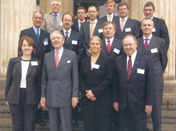
Stanford Club of Germany meets with Prof. Dr. h.c. mult. Berthold Beitz, Dr. Thomas Kempf, and Prof. Dr. Norman Naimark at the 2006 Internship Seminar, Villa Hügel
Stanford University in Berlin
Projects & Partners
Early 1950s: Stanford students in California donate books to the library of the newly founded Freie Universität Berlin; Stanford becomes first universtiy to establish a direct exchange fellowship with the F.U.
1958: Stanford opens its first „overseas campus“ in Beutelsbach/Baden-Württemberg, setting the cornerstone for a study-abroad network of unparalleled scope and interdisciplinary breadth. As many as 40% of Stanford undergraduates attend one of ten campusses of the Bing Overses Studies Program, now named after Helen & Peter Bing, who endowed the program in 2005.
1975: Stanford opens campus in West Berlin, initially occupying classrooms at the Freie Universität Berlin, with whom Stanford in Berlin to this day enjoys a close and active partnership.
1977: reconstruction of the ruins of the historic Muthesius villa, Haus Cramer (Berlin-Dahlem), by the Berlin Senate for use by Stanford in Berlin), inaugurated February 1978.
1980: Stanford Alumni Club of Germany, e.V. (later Stanford Club of Germany, e.V. = SCoG) is founded. The SCoG soon endorses Stanford in Berlin as flagship program for German development activities. Successful projects funded through the SCoG include the Visiting German Chair at Stanford (enabled by10-years’ funding through the Auswärtiges Amt and the Volkswagen-Stiftung); the Stanford Symposia on Transition in Europe at Stanford in Berlin (1991-1996); historical reconstruction, modernization and expansion of Haus Cramer (1988, 1996, and 2001) with support of Stiftung Deutsche Klassenlotterie Berlin; establishment of the SCoG Endowment for Stanford in Berlin, enabled through the support of German partners; the annual Stanford-Siemens Workshop on Globalization (beginning in 2003).
1982: The Krupp Internship Program for Stanford Students in Germany is established through the foresight and generosity of the Alfried Krupp von Bohlen und Halbach-Stifung under the leadership of Prof. Dr. h.c. mult. Berthold Beitz, building on a successful pilot project conducted through the German Academic Exchange Service (DAAD) the previous year. This exceptional Program has to date placed over 850 Stanford students in full-time internships of 3 to 6 months with German host institutions.
2000: Stanford purchases Haus Cramer from the city
of Berlin, thanks to the generosity and vision of Berlin alumnus
Hans George Will. The purchase, supported and endorsed by the Berlin
Senator for Science, Research and Culture, the Berlin Parliament
and Stanford University President Prof. Gerhard Casper, is facilitated
through the efforts of Director of Stanford Overseas Studies Prof.
Russell Berman and Director of Stanford in Berlin Dr. Karen Kramer.
2005: H.G. Will Fund established by Berlin Alumnus Hans George
Will with matching funds by the Hewlett Foundation; the Fund supports
enrichment activities at Stanford in Berlin, most importantly the
H.G. Will Field Trips on European Expansion.